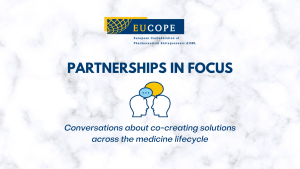News / Partnerships in Focus - May 3, 2022
Partnerships in Focus: Q&A with Takeda’s Toon Digneffe
At EUCOPE, our commitment is to lead and engage in partnerships spanning the entire medicine lifecycle to find actionable solutions that benefit our members, the patients they serve and healthcare systems overall. Through our Partnerships in Focus series, we’ll be highlighting different associates that we partner with to co-create solutions for various challenges across the healthcare ecosystem.
For the first edition of our Partnerships in Focus series, we speak with Toon Digneffe, Head of Public Affairs and Partnerships Public Policy of Takeda. Toon is also involved in several multi-stakeholder partnerships with EUCOPE, including: European Expert Group on Orphan Drug Incentives, European Alliance for Transformative Therapies (TRANSFORM), Together4RD, RWE4Decisions, Rare Impact, and ORPH-VAL.
Mr Digneffe has extensive experience in the pharmaceutical industry, as he has been working in the sector since 2002 in several companies after having spent time in the European Commission and Consultancy at the early start of his career. He worked as Head of Public Affairs for Shire since 2016, before its acquisition from Takeda. Previously, he worked for Baxter International for over 13 years, and for Baxalta, with roles of increasing responsibility at local, regional and global level. Toon holds a Master in Political Science from the University of Leuven, Belgium/ University of Leicester, England and a Post-Graduate Degree in European Studies from the College of Europe, Bruges, Belgium. He is co-author of the book by Martin Westlake, “the Council of the European Union”, John Harper publishing.
You can watch the full Q&A below on our YouTube channel. The transcript can be found below.
What do you see as the biggest challenge facing the life sciences industry today?
If I would have to highlight one it would be trust – building trust with society at large – At Takeda, we have this built into what we call Takeda-ism – we operate in a value framework of Patient Trust Reputation and Business; always in that order.
The pandemic has unveiled innovative new ways of working and has created unexpected but valuable alliances that we can build on. How can we take these lessons learned to rework the rare disease ecosystem through partnership?
The COVID-19 pandemic has thought us many things. One of them is the importance of Partnerships across many different stakeholders – those were very much needed and have been the key to many of the solutions in response to the pandemic challenges. Trust has been the key factor in establishing these partnerships.
First of all, I believe it is important to continue to recognize rare diseases as a public health priority. From there we can build a lot of partnerships across the patient journey and medicine lifecycle to address the unmet need of patients, ranging from early diagnosis (for rare disease patients it takes on average more than 5 years to receive a diagnosis) to access to treatment for those 95 % of patients without treatment today.
A Takeda-commissioned study identified practical potential mechanisms to unlock wider acceptance of new medicines across Europe, such as a public-private partnership for basic research funding. How would this partnership, and ones similar, translate innovation into treatments for patients?
One of the key recommendations of this study is indeed the role of partnerships. To address the unmet need of the 95 % of rare disease patients without treatment today, the study recommends to go beyond the incentives included within the EU Orphan Drug Regulation and therefore create partnerships across the medicine lifecycle. Partnerships by nature are more complex then the incentives included in the EU framework – these incentives are bilateral in nature, whereas partnerships involve many stakeholders with different agendas. But by creating common solutions they can be more effective to address the remaining barriers.
The study identifies 6 partnership-type solutions across the medicine lifecycle. One example early in the lifecycle is the role of public-private partnerships to address the barrier of basic research funding. Another example further down the lifecycle is the role of value-based partnerships and more specifically value-based contracts that allow for a wide and fast patient access to treatments.
As a board member of EUCOPE as well as a significant partner across the medicine lifecycle, what would you say are the benefits of partnering with EUCOPE?
I believe EUCOPE has built trust and therefore credibility by building several partnerships that co-create solutions together with other stakeholders. Three examples are 1) the European Expert Group on Orphan Drug Incentives in light of the ongoing review of the EU Orphan Drug Regulation; 2) RWE4Decisions which aims to increase trust in the use of RWE as a tool to facilitate earlier patient access; 3) Together4RareDiseases, the recently launched partnership looking at how to further strengthen and unlock the value of the European Reference Networks
EUCOPE plays a central role in all these partnerships and hereby raises the voice of the small and medium sized innovative biopharmaceutical companies across Europe.
You can interact with Toon Digneffe on Twitter or connect via LinkedIn.
To learn more about our partnerships or how to join EUCOPE as a member, please contact us at office@eucope.org


